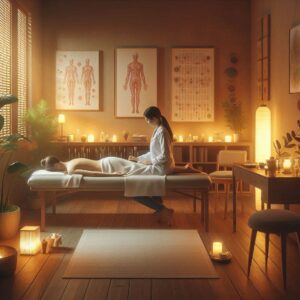Unlock the Power of Acupuncture for Lasting Insomnia Relief
Insomnia is a prevalent sleep disorder that can significantly disrupt your daily life by hindering your ability to fall asleep, remain asleep, or achieve the deep, restorative slumber essential for your overall health. This condition can manifest as a short-term challenge or develop into a chronic issue that lingers for months or even years. Various factors can trigger insomnia, including stress, constant worry, underlying depression, irregular sleep patterns, specific medications, high caffeine intake, and various medical conditions. By identifying these triggers, you can develop effective treatment methods that help restore healthy sleep cycles and enhance your overall well-being.
The persistent struggle with inadequate sleep can lead to serious implications for both physical and emotional health. From a health standpoint, chronic sleep deprivation may compromise the immune system, heighten the risk of severe health issues such as cardiovascular diseases, increase vulnerability to conditions like diabetes, contribute to obesity, and adversely affect cognitive abilities. On an emotional level, it can exacerbate anxiety, depression, mood fluctuations, and irritability, all of which can detrimentally affect mental health. Deficiencies in focus, memory, and decision-making can complicate the challenges posed by chronic insomnia. Understanding and addressing the root causes of insomnia is vital for mitigating these negative health effects and fostering a greater sense of well-being.
Comprehensive Insights into Insomnia and Its Far-Reaching Effects
- Insomnia is a complex sleep disorder that is characterized by challenges in initiating sleep, maintaining sleep throughout the night, or waking too early, impacting daily functioning.
- This condition may stem from a variety of issues, including stress, anxiety, depression, poor sleep hygiene practices, and side effects from certain medications.
- Chronic sleep deprivation can have severe consequences on your health, leading to a weakened immune system, increased risk of long-term illnesses, impaired cognitive function, and emotional instability.
- Acupuncture has demonstrated effectiveness in improving sleep quality by stimulating specific acupoints, which aids in balancing the body’s energy flow and promoting relaxation.
- Research indicates that acupuncture can significantly enhance sleep quality and alleviate a range of symptoms associated with insomnia.
- This time-honored healing practice targets insomnia by reducing anxiety, promoting relaxation, and restoring balance to the body’s energy flow.
- Studies suggest that acupuncture may enhance melatonin production, help regulate the circadian rhythm, and improve overall sleep quality.
- Commonly targeted acupoints for insomnia treatment include Shenmen, Sishencong, Anmian, and Yin Tang.
- Skilled practitioners utilize fine needles to stimulate specific points, fostering a sense of tranquility, alleviating stress, and enhancing overall sleep quality.
- Acupoints like Shenmen are celebrated for their calming effects, while Anmian is particularly effective in soothing the mind and promoting restful sleep.
- Traditional Chinese medicine underscores the significance of maintaining balanced energy flow and achieving harmony between yin and yang to foster quality sleep.
- Incorporating herbal remedies like chamomile, valerian root, and lavender, along with dietary advice such as consuming warm, easy-to-digest foods, can greatly enhance sleep quality.
- Integrating traditional Chinese medicine techniques, including acupressure, herbal therapies, and Qi gong, can complement acupuncture for effective insomnia management.
- During an acupuncture session focusing on insomnia, practitioners conduct a thorough assessment to evaluate your sleep habits, lifestyle choices, and overall health.
- The insertion of delicate needles into targeted acupoints is aimed at fostering relaxation, alleviating stress, and promoting improved sleep quality.
- Multiple sessions over several weeks or months may be necessary to achieve optimal results in effectively managing insomnia.
- Creating a conducive sleep environment involves minimizing noise and light disturbances, maintaining a comfortable room temperature, and employing relaxation techniques like meditation or deep breathing.
- Establishing a consistent sleep schedule, steering clear of caffeine and screens before bedtime, and engaging in regular physical activity can significantly enhance sleep quality.
- Implementing stress management techniques, such as yoga, meditation, or tai chi, can further augment the effectiveness of your insomnia treatment.
- Collaborating with healthcare professionals, including psychologists, nutritionists, or sleep specialists, can help integrate acupuncture with other strategies for managing insomnia.
- Complementary therapies like yoga, meditation, or massage can support relaxation, reduce stress levels, and improve sleep quality.
- Addressing underlying health issues such as anxiety, depression, or chronic pain is essential for achieving comprehensive insomnia relief.
 Discover How Acupuncture Can Transform Your Sleep Experience
Discover How Acupuncture Can Transform Your Sleep Experience
Acupuncture is widely acknowledged as a cornerstone of traditional Chinese medicine (TCM), celebrated for its calming effects and its ability to facilitate restful sleep. This holistic practice seeks to regulate the body’s energy flow, or qi, by stimulating specific acupoints. By positively influencing the nervous system, lowering stress and anxiety levels, and correcting internal imbalances that contribute to insomnia, acupuncture can markedly improve sleep quality. This ancient therapeutic approach not only helps to reduce the frequency of nighttime awakenings but also cultivates an overall sense of tranquility and well-being, thereby maximizing the restorative benefits of sleep.
Extensive scientific research and clinical studies have consistently affirmed the positive impact of acupuncture on sleep quality. A significant study published in The Journal of Alternative and Complementary Medicine revealed that patients suffering from insomnia reported substantial improvements in their sleep quality following acupuncture treatment. Additionally, research featured in the Journal of Sleep Research confirmed that acupuncture effectively mitigated the severity of insomnia while enhancing overall sleep quality. These compelling findings highlight acupuncture’s potential as a safe and natural therapeutic option for those struggling with sleep disturbances.
Identifying Key Acupuncture Points to Enhance Sleep Quality
Experienced acupuncturists strategically utilize specific acupoints to effectively combat insomnia and improve sleep quality. These targeted acupuncture points are crucial in addressing sleep-related issues. For example, the Shenmen point, located on the wrist, is renowned for its ability to promote tranquility and relaxation in both the mind and body. Another vital point, Sanyinjiao, located on the lower thigh, is believed to nourish blood and yin, leading to reduced anxiety and enhanced relaxation. The Anmian point, positioned behind the ear, is commonly used to alleviate insomnia and encourage a peaceful night’s sleep. Additionally, the Yintang point, situated between the eyebrows, is celebrated for its calming effects on mental clarity.
During acupuncture treatments, practitioners carefully insert small needles into the skin at precise depths to stimulate these specific points effectively. This stimulation is thought to help regulate the body’s energy flow, promoting a sense of balance and harmony. As a result, many individuals report a decrease in insomnia symptoms and a remarkable improvement in sleep quality following treatment.
 Delving into the Holistic Principles of Traditional Chinese Medicine for Sleep Enhancement
Delving into the Holistic Principles of Traditional Chinese Medicine for Sleep Enhancement
Traditional Chinese medicine (TCM) embraces a holistic approach to health and wellness, recognizing the intricate connections between the body’s systems and the necessity of balance for optimal health. TCM principles regarding sleep emphasize the importance of restoring internal harmony to facilitate restful slumber. Herbal remedies are often prescribed to address imbalances that lead to sleep disturbances. Herbs such as valerian root, chamomile, lavender, and passionflower are valued for their soothing properties, aiding individuals in achieving more restorative sleep. These natural solutions are believed to enhance physical relaxation and improve overall sleep quality.
In practice, TCM practitioners frequently offer dietary recommendations aimed at enhancing sleep quality. Individuals experiencing insomnia are typically encouraged to consume foods that nourish the blood and yin. Such dietary choices may include dark leafy greens, nuts, seeds, and seafood. Additionally, practices like Qigong, tai chi, and acupressure, along with other TCM therapies, can effectively alleviate insomnia by fostering relaxation, reducing stress, and improving overall well-being, ultimately contributing to better sleep quality.
What to Anticipate During Your First Acupuncture Session for Insomnia Relief
When you attend your initial acupuncture session specifically tailored to address insomnia, the acupuncturist will perform a thorough evaluation of your sleep patterns, overall health, and any underlying factors contributing to your sleeplessness. Utilizing their expertise, the acupuncturist will devise a personalized treatment plan that caters to your unique needs and circumstances.
The acupuncture treatment process involves the gentle insertion of fine needles into designated points on your body. Patients are generally encouraged to relax for 20 to 30 minutes while the needles remain in place. During this time, individuals may feel a slight tingling sensation or mild discomfort; however, the overall experience is often described as soothing and calming, creating an ideal atmosphere for sleep.
The frequency and scheduling of acupuncture sessions can vary based on the severity of insomnia and individual responses to treatment. While some patients notice improvements in their sleep quality after just a few sessions, others may require ongoing treatment to achieve more enduring effects.
Implementing Lifestyle Modifications to Enhance the Benefits of Acupuncture for Insomnia
In conjunction with acupuncture, adopting specific lifestyle adjustments can greatly elevate your sleep quality. Crafting a sleep-friendly environment is crucial for optimizing your overall sleep experience. Enhancing your sleeping area entails ensuring your bedroom is dark, peaceful, and inviting, using comfortable bedding and pillows, and establishing a calming bedtime routine that signals to your body it is time to unwind for the night.
Incorporating healthy habits can significantly enhance your sleep quality. This includes maintaining a consistent sleep schedule, avoiding caffeine and electronic devices in the hours leading up to bedtime, engaging in regular physical activity, and practicing relaxation techniques such as deep breathing or meditation to quiet the mind and promote restful sleep.
Effective stress management strategies can profoundly enhance the outcomes of acupuncture treatment for insomnia. Engaging in activities like yoga, meditation, or massage therapy can relieve anxiety and encourage relaxation. These practices offer essential support to help you unwind, making it easier to both fall asleep and maintain sleep throughout the night.
 Holistic Integration of Acupuncture with Additional Effective Strategies for Insomnia Relief
Holistic Integration of Acupuncture with Additional Effective Strategies for Insomnia Relief
Under the guidance of a skilled practitioner, acupuncture can become an invaluable element of a comprehensive strategy for managing insomnia, offering crucial relief for those struggling with sleep disorders. Collaborating with other healthcare professionals, such as primary care physicians or mental health specialists, is essential for delivering holistic care to individuals experiencing insomnia.
By blending acupuncture with complementary practices such as yoga, meditation, and massage therapy, individuals can cultivate a well-rounded approach to promote relaxation and alleviate stress, ultimately leading to improved sleep quality. These methods can be seamlessly integrated into a personalized treatment plan designed to meet each individual’s unique needs, ensuring they feel understood and supported throughout their journey.
Moreover, addressing any underlying health issues that may worsen insomnia is critical. Managing chronic pain, anxiety, depression, or other medical conditions that disrupt sleep quality can be a key aspect of the overall treatment process. Individuals who adopt a holistic perspective on their health and well-being can significantly enhance their sleep quality and overall quality of life.
Ultimately, insomnia can deeply affect both physical and emotional well-being, emphasizing the importance of exploring effective treatment methods. A knowledgeable practitioner can utilize acupuncture to enhance sleep quality by addressing internal imbalances and fostering a sense of calm. By integrating lifestyle changes, principles of traditional Chinese medicine, and other complementary therapies, acupuncture can substantially improve both sleep quality and overall wellness. This holistic approach offers hope and positivity for individuals seeking relief from insomnia.
 Frequently Asked Questions About Acupuncture and Insomnia Relief Strategies
Frequently Asked Questions About Acupuncture and Insomnia Relief Strategies
Understanding Acupuncture: Benefits and Treatment Mechanisms
Acupuncture is a time-honored practice within traditional Chinese medicine, wherein skilled practitioners insert thin needles into specific points on the body. This technique facilitates the flow of energy and enhances the body’s natural healing processes, assisting in alleviating various health issues, including insomnia and sleep disturbances.
Defining Insomnia: Characteristics and Challenges
Insomnia is a sleep disorder that obstructs the ability to fall asleep, remain asleep, or achieve restorative sleep. This persistent condition often results in daytime fatigue and reduced functionality, underscoring the importance of seeking effective treatment solutions to improve sleep quality.
How Acupuncture Provides Relief from Insomnia Symptoms
Acupuncture has been shown to positively influence insomnia by restoring balance to the body’s nervous system, alleviating stress and anxiety, and inducing a state of relaxation. This approach ultimately enhances both the quality and duration of sleep, establishing acupuncture as a viable treatment option for those suffering from sleep disturbances.
Research Evidence Supporting Acupuncture’s Effectiveness for Insomnia Relief
A variety of studies indicate that acupuncture can enhance sleep quality and alleviate insomnia symptoms. While existing evidence supports its benefits, further exploration is necessary to reinforce these findings and arrive at more conclusive evaluations regarding its effectiveness.
What to Expect During an Acupuncture Session for Insomnia Management
During an acupuncture session, a skilled practitioner carefully inserts slender needles into specific points on your body associated with promoting sleep and relaxation. The needles are typically left in place for 15-30 minutes while you unwind and embrace tranquility.
Potential Side Effects of Acupuncture Treatment for Insomnia
When performed by a trained and experienced practitioner, acupuncture is generally safe. However, some individuals may experience minor side effects such as tenderness, discoloration, or slight bleeding at the needle insertion sites, which are typically temporary and resolve quickly.
Can Acupuncture Serve as a Standalone Treatment for Insomnia Relief?
Acupuncture can be an effective treatment for insomnia when integrated with complementary strategies such as lifestyle changes, relaxation techniques, and cognitive behavioral therapy for insomnia (CBT-I), creating a comprehensive treatment plan that addresses all aspects of sleep health.
Determining the Number of Acupuncture Sessions Required for Insomnia Improvement
The number of acupuncture sessions needed to notice improvements in insomnia varies based on individual circumstances and the severity of symptoms. Many individuals report enhancements after just a few sessions, while others may require ongoing treatment for sustained benefits.
Presented By:
References
If You Only Get 3 Hours of Sleep One Night – What Happens – Themes Quality. https://www.themesquality.com/what-happens-if-you-only-get-3-hours-of-sleep-for-one-night/
Sleep Better with 30 Essential Oils: A Natural Remedy for Insomnia and Restless Nights – Hotnewamapiano. https://hotnewamapiano.com/2023/02/11/sleep-better-with-30-essential-oils-a-natural-remedy-for-insomnia-and-restless-nights/
Migraines Helped by Acupuncture. https://www.ncbi.nlm.nih.gov/pmc/articles/PMC3291665/
The Article: Acupuncture Techniques for Improving Sleep Quality appeared first on Acupuncture Blackpool.
The Article Acupuncture Techniques for Better Sleep Quality appeared first on https://mcrtherapies.com
The Article Acupuncture Techniques to Improve Sleep Quality Was Found On https://limitsofstrategy.com
Your exploration of insomnia’s multifaceted nature resonates deeply with many who struggle with sleep disorders. I appreciate how you highlight the numerous factors that can contribute to insomnia, making it clear that it’s not merely a result of poor habits but often involves a complex interplay of stress, emotional health, and even lifestyle choices.
It’s interesting to acknowledge just how deeply insomnia can weave itself into the fabric of our daily lives. You touched on an important point—understanding that sleep challenges often stem from a web of influences encourages a more compassionate approach, both to ourselves and to others facing similar struggles.
I definitely resonate with your thoughts on insomnia and its pervasive influence. It’s fascinating—yet also a bit daunting—how interconnected our daily experiences can be with our sleep patterns. I often find myself reflecting on how technology has shaped our sleep environments. The blue light from screens, the constant accessibility to information, and even social media’s never-ending scroll can create this backdrop of stimulation that interferes with rest.
It’s fascinating how various physical challenges, like a frozen shoulder, can also impact our daily lives, and understanding the underlying causes can really foster empathy as we navigate our own and others’ experiences.
‘Frozen Shoulder: Causes and Effective Treatment Options’
https://seopitstop.co.uk/frozen-shoulder-causes-and-effective-treatment-options/.
I appreciate your thoughts on insomnia. It really is a bit of a wild beast, isn’t it? You think you’re just dealing with a little restless night here and there, but then you start peeling back the layers and—voila!—you’ve uncovered an onion of stress, lifestyle choices, and a side of emotional health. Honestly, it’s enough to make you wonder if sleep is just an elusive urban legend, like Bigfoot or a decent public bathroom.
Your post on the impact of insomnia really resonated with me, especially the way you highlighted its multifaceted causes. I’ve personally experienced the cycle of stress leading to sleepless nights, and it’s fascinating yet alarming how quickly it can snowball into a more significant issue.
I completely understand what you mean about the cycle of stress and insomnia. It’s such a common struggle nowadays, and it really does show how interconnected our mental and physical health can be. I’ve noticed that even minor stressors can keep my mind racing at night, making it tough to wind down.
Ah, insomnia—the adult version of being a kid and trying to avoid bedtime! I’ve been wrestling with this beast for ages. It’s remarkable how my brain seems to think it’s the perfect time to audition for a one-person show of “What If?” in the wee hours. Stress, caffeine, and the occasional existential crisis serve as my uninvited cast members.